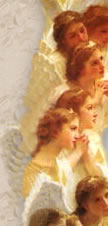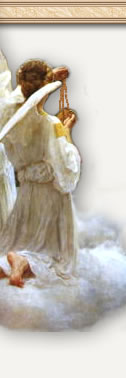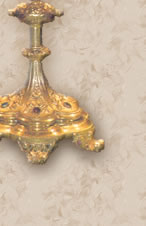




 |
|

|
|
|||||||||||
|
|
|
|
||||||||||||
 |
|
|
||||||||||||
 |
|
 |
|
|||||||||||
|
|
||||||||||||||
 |
 |
|
|
|
|
Present at the Demolition The following conversation with Dr. Alice von Hildebrand opens our discussion of this issue’s focus: The Crisis in the Church: Scenarios for a Solution. Dr. von Hildebrand, professor of philosophy emeritus of Hunter College (City University of New York), has just completed The Soul of a Lion, a biography of her husband, Dietrich. TLM: Dr. von Hildebrand, at the time that Pope John XXIII summoned the Second Vatican Council, did you perceive a need for a reform within the Church? AVH:: Most of the insights about this come from my husband. He always said that the members of the Church, due to the effects of original sin and actual sin, are always in need of reform. The Church’s teaching, however, is from God. Not one iota is to be changed or considered in need of reform. TLM: In terms of the present crisis, when did you first perceive something was terribly wrong? AVH:: It was in February 1965. I was taking a sabbatical year in Florence. My husband was reading a theological journal, and suddenly I heard him burst into tears. I ran to him, fearful that his heart condition had suddenly caused him pain. I asked him if he was all right. He told me that the article that he had been reading had provided him with the certain insight that the devil had entered the Church. Remember, my husband was the first prominent German to speak out publicly against Hitler and the Nazis. His insights were always prescient. TLM: Had your husband ever talked about his fear for the Church before this incident? AVH:: I relate in my biography of my husband, The Soul of a Lion, that a few years after his conversion to Catholicism in the 1920s, he began teaching at the University of Munich. Munich was a Catholic city. Most Catholics at the time went to Mass, but he always said that it was there that he became aware of the loss of a sense of the supernatural among Catholics. One incident especially offered him sufficient proof, and it greatly saddened him. When passing through a door, my husband would always give precedence to those of his students who were priests. One day, one of his colleagues (a Catholic) expressed his astonishment and disapproval: “Why do you let your students step ahead of you?” “Because they are priests,” replied my husband. “But they do not have a Ph.D.” My husband was grieved. To value a Ph.D. is a natural response; to feel awe for the sublimity of the priesthood is a supernatural response. The professor’s attitude proved that his sense for the supernatural had been eroded. That was long before Vatican II. But until the Council, the beauty and the sacredness of the Tridentine liturgy masked this phenomenon. TLM: Did your husband think that the decline in a sense of the supernatural began around that time, and if so, how did he explain it? AVH:: No, he believed that after Pius X’s condemnation of the heresy of Modernism, its proponents merely went underground. He would say that they then took a much more subtle and practical approach. They spread doubt simply by raising questions about the great supernatural interventions throughout salvation history, such as the Virgin Birth and Our Lady’s perpetual virginity, as well as the Resurrection, and the Holy Eucharist. They knew that once faith – the foundation – totters, the liturgy and the moral teachings of the Church would follow suit. My husband entitled one of his books The Devastated Vineyard. After Vatican II, a tornado seemed to have hit the Church. Modernism itself was the fruit of the calamity of the Renaissance and the Protestant Revolt, and it took a long historical process to unfold. If you were to ask a typical Catholic in the Middle Ages to name a hero or heroine, he would answer with the name of a saint. The Renaissance began to change that. Instead of a saint, people would think of geniuses as persons to emulate, and with the oncoming of the industrial age, they would answer with the name of a great scientist. Today, they would answer with a sports figure or cinema personality. In other words, the loss of the sense of the supernatural has brought an inversion of the hierarchy of values. Even the pagan Plato was open to a sense of the supernatural. He spoke of the weakness, frailty and cowardice often evidenced in human nature. He was asked by a critic to explain why he had such a low opinion of humanity. He replied that he was not denigrating man, only comparing him to God. With the loss of a sense of the supernatural, there is a loss of the sense of a need for sacrifice today. The closer one comes to God, the greater should be one’s sense of sinfulness. The further one gets from God, as today, the more we hear the philosophy of the new age: “I’m OK, You’re OK.” This loss of the inclination to sacrifice has led to the obscuring of the Church’s redemptive mission. Where the Cross is downplayed, our need for redemption is given hardly a thought. The aversion to sacrifice and redemption has assisted the secularization of the Church from within. We have been hearing for many years from priests and bishops about the need for the Church to adapt herself to the world. Great popes like St. Pius X said just the opposite: the world must adapt itself to the Church. TLM: From our conversation throughout this afternoon, I must conclude that you don’t believe that the accelerating loss of the sense of the supernatural is an accident of history. AVH:: No, I do not. There have been two books published in Italy in recent years that confirm what my husband had been suspecting for some time; namely, that there has been a systematic infiltration of the Church by diabolical enemies for much of this century. My husband was a very sanguine man and optimistic by nature. During the last ten years of his life, however, I witnessed him many times in moments of great sorrow, and frequently repeating, “They have desecrated the Holy Bride of Christ.” He was referring to the “abomination of desolation” of which the prophet Daniel speaks. TLM: This is a critical admission, Dr. von Hildebrand. Your husband had been called a twentieth-century Doctor of the Church by Pope Pius XII. If he felt so strongly, didn’t he have access to the Vatican to tell Pope Paul VI of his fears? AVH:: But he did! I shall never forget the private audience we had with Paul VI just before the end of the Council. It was on June 21, 1965. As soon as my husband started pleading with him to condemn the heresies that were rampant, the Pope interrupted him with the words, “Lo scriva, lo scriva.” (“Write it down.”) A few moments later, for the second time, my husband drew the gravity of the situation to the Pope’s attention. Same answer. His Holiness received us standing. It was clear that the Pope was feeling very uncomfortable. The audience lasted only a few minutes. Paul VI immediately gave a sign to his secretary, Fr. Capovilla, to bring us rosaries and medals. We then went back to Florence where my husband wrote a long document (unpublished today) that was delivered to Paul VI just the day before the last session of the Council. It was September of 1965. After reading my husband’s document, he said to my husband’s nephew, Dieter Sattler, who had become the German ambassador to the Holy See, that he had read the document carefully, but that “it was a bit harsh.” The reason was obvious: my husband had humbly requested a clear condemnation of heretical statements. TLM: You realize, of course, Doctor, that as soon as you mention this idea of infiltration, there will be those who roll their eyes in exasperation and remark, “Not another conspiracy theory!” AVH:: I can only tell you what I know. It is a matter of public record, for instance, that Bella Dodd, the ex-Communist who reconverted to the Church, openly spoke of the Communist Party’s deliberate infiltration of agents into the seminaries. She told my husband and me that when she was an active party member, she had dealt with no fewer than four cardinals within the Vatican “who were working for us.” Many a time I have heard Americans say that Europeans “smell conspiracy wherever they go.” But from the beginning, the Evil One has “conspired” against the Church – and has always aimed in particular at destroying the Mass and sapping belief in the Real Presence of Christ in the Eucharist. That some people are tempted to blow this undeniable fact out of proportion is no reason for denying its reality. On the other hand, I, European born, am tempted to say that many Americans are naïve; living in a country that has been blessed by peace, and knowing little about history, they are more likely than Europeans (whose history is a tumultuous one) to fall prey to illusions. Rousseau has had an enormous influence in the United States. When Christ said to His apostles at the Last Supper that “one of you will betray Me,” the apostles were stunned. Judas had played his hand so artfully that no one suspected him, for a cunning conspirator knows how to cover his tracks with a show of orthodoxy. TLM: Do the two books by the Italian priest you mentioned before the interview contain documentation that would provide evidence of this infiltration? AVH:: The two books I mentioned were published in 1998 and 2000 by an Italian priest, Don Luigi Villa of the diocese of Brescia, who at the request of Padre Pio has devoted many years of his life to the investigation of the possible infiltration of both Freemasons and Communists into the Church. My husband and I met Don Villa in the sixties. He claims that he does not make any statement that he cannot substantiate. When Paulo Sesto Beato? (1998) was published the book was sent to every single Italian bishop. None of them acknowledged receipt; none challenged any of Don Villa’s claims. In this book, he relates something that no ecclesiastical authority has refuted or asked to be retracted – even though he names particular personalities in regard to the incident. It pertains to the rift between Pope Pius XII and the then Bishop Montini (the future Paul VI) who was his Undersecretary of State. Pius XII, conscious of the threat of Communism, which in the aftermath of World War II was dominating nearly half of Europe, had prohibited the Vatican staff from dealing with Moscow. To his dismay, he was informed one day through the Bishop of Upsala (Sweden) that his strict order had been contravened. The Pope resisted giving credence to this rumor until he was given incontrovertible evidence that Montini had been corresponding with various Soviet agencies. Meanwhile, Pope Pius XII (as had Pius XI) had been sending priests clandestinely into Russia to give comfort to Catholics behind the Iron Curtain. Every one of them had been systematically arrested, tortured, and either executed or sent to the gulag. Eventually a Vatican mole was discovered: Alighiero Tondi, S.J., who was a close advisor to Montini. Tondi was an agent working for Stalin whose mission was to keep Moscow informed about initiatives such as the sending of priests into the Soviet Union. Add to this Pope Paul’s treatment of Cardinal Mindszenty. Against his will, Mindszenty was ordered by the Vatican to leave Budapest. As most everyone knows, he had escaped the Communists and sought refuge in the American embassy compound. The Pope had given him his solemn promise that he would remain primate of Hungary as long as he lived. When the Cardinal (who had been tortured by the Communists) arrived in Rome, Paul VI embraced him warmly, but then sent him into exile in Vienna. Shortly afterwards, this holy prelate was informed that he had been demoted, and had been replaced by someone more acceptable to the Hungarian Communist government. More puzzling, and tragically sad, is the fact that when Mindszenty died, no Church representative was present at his burial. Another of Don Villa’s illustrations of infiltration is one related to him by Cardinal Gagnon. Paul VI had asked Gagnon to head an investigation concerning the infiltration of the Church by powerful enemies. Cardinal Gagnon (at that time an Archbishop) accepted this unpleasant task, and compiled a long dossier, rich in worrisome facts. When the work was completed, he requested an audience with Pope Paul in order to deliver personally the manuscript to the Pontiff. This request for a meeting was denied. The Pope sent word that the document should be placed in the offices of the Congregation for the Clergy, specifically in a safe with a double lock. This was done, but the very next day the safe deposit box was broken and the manuscript mysteriously disappeared. The usual policy of the Vatican is to make sure that news of such incidents never sees the light of day. Nevertheless, this theft was reported even in L’Osservatore Romano (perhaps under pressure because it had been reported in the secular press). Cardinal Gagnon, of course, had a copy, and once again asked the Pope for a private audience. Once again his request was denied. He then decided to leave Rome and return to his homeland in Canada. Later, he was called back to Rome by Pope John Paul II and made a cardinal. TLM: Why did Don Villa write these works singling out Paul VI for criticism? AVH:: Don Villa reluctantly decided to publish the books to which I have alluded. But when several bishops pushed for the beatification of Paul VI, this priest perceived it as a clarion call to print the information he had gathered through the years. In so doing, he was following the guidelines of a Roman Congregation, informing the faithful that it was their duty as members of the Church to relay to the Congregation any information that might militate against the candidate’s qualifications for beatification. Considering the tumultuous pontificate of Paul VI, and the confusing signals he was giving, e.g.: speaking about the “smoke of Satan that had entered the Church,” yet refusing to condemn heresies officially; his promulgation of Humanae Vitae (the glory of his pontificate), yet his careful avoidance of proclaiming it ex cathedra; delivering his Credo of the People of God in Piazza San Pietro in 1968, and once again failing to declare it binding on all Catholics; disobeying the strict orders of Pius XII to have no contact with Moscow, and appeasing the Hungarian Communist government by reneging on the solemn promise he had made to Cardinal Mindszenty; his treatment of holy Cardinal Slipyj, who had spent seventeen years in a Gulag, only to be made a virtual prisoner in the Vatican by Paul VI; and finally asking Archbishop Gagnon to investigate possible infiltration in the Vatican, only to refuse him an audience when his work was completed – all these speak strongly against the beatification of Paolo VI, dubbed in Rome, “Paolo Sesto, Mesto” (Paul VI, the sad one). That the duty to publish this depressing information was onerous and cost Don Villa great sorrow cannot be doubted. Any Catholic rejoices when he can look up to a Pope with boundless veneration. But Catholics also know that even though Christ never promised He would give us perfect leaders, He did promise that the gates of hell shall not prevail. Let us not forget that even though the Church has had some very bad popes, and some mediocre ones, she has been blessed with many great popes. Eighty of them have been canonized and several have been beatified. This is a success story that does not bear parallel in the secular world. God alone is the judge of Paul VI. But it cannot be denied that his pontificate was a very complex and tragic one. It was under him that, in the course of fifteen years, more changes were introduced in the Church than in all preceding centuries combined. What is worrisome is that when we read the testimony of ex-Communists like Bella Dodd, and study Freemasonic documents (dating from the nineteenth century, and usually penned by fallen-away priests like Paul Roca), we can see that, to a large extent, their agenda has been carried out: the exodus of priests and nuns after Vatican II, dissenting theologians not censured, feminism, the pressure put on Rome to abolish priestly celibacy, immorality in the clergy, blasphemous liturgies (see the article by David Hart in First Things, April 2001, “The Future of the Papacy”), the radical changes that have been introduced into the sacred liturgy (see Cardinal Ratzinger’s book Milestones, pp. 126 and 148, Ignatius Press), and a misleading ecumenism. Only a blind person could deny that many of the Enemy’s plans have been perfectly carried out. One should not forget that the world was shocked at what Hitler did. People like my husband, however, actually read what he had said in Mein Kampf. The plan was there. The world simply chose not to believe it. But grave as the situation is, no committed Catholic can forget that Christ has promised that He will remain with His Church to the very end of the world. We should meditate on the scene related in the Gospel when the apostles’ boat was battered by a fierce storm. Christ was sleeping! His terrified followers woke Him up: He said one word, and there was a great calm. “O ye of little faith!” TLM: I take it by your remarks about ecumenism that you don’t agree with the current policy of “convergence” rather than “conversion”? AVH:: Let me relate an incident that caused my husband grief. It was 1946, just after the war. My husband was teaching at Fordham, and there appeared in one of his classes a Jewish student who had been a naval officer during the war. He would eventually tell my husband about a particularly stunning sunset in the Pacific and how it had led him to the quest for the truth about God. He first went to Columbia to study philosophy, and he knew that this was not what he was looking for. A friend suggested he try philosophy at Fordham and mentioned the name Dietrich von Hildebrand. After just one class with my husband, he knew he had found what he was looking for. One day after class my husband and this student went for a walk. He told my husband during this time that he was surprised at the fact that several professors, after discovering he was Jewish, assured him that they would not try to convert him to Catholicism. My husband, stunned, stopped, turned to him and said, “They said what?!” He repeated the story and my husband told him, “I would walk to the ends of the earth to make you a Catholic.” To make a long story short, the young man became a Catholic, was ordained a Carthusian priest, and went on to enter the only Charter House in the United States (in Vermont)! TLM: You spent many years teaching at Hunter College. AVH:: Yes, and several of my students became Catholics. Oh, the beautiful conversion stories I could relate if I had time – young people who were swept up by truth! I want to make one point very clear, however. I did not convert my students. The most we can do is to pray to be God’s instruments. To be an instrument we must strive to live the Gospel every day and in every circumstance. Only God’s grace can give us the desire and ability to do that. It is one of the fears I have about traditional Catholics. Some flirt with fanaticism. A fanatic is one who considers truth to be his personal possession instead of God’s gift. We are servants of the truth, and it is as servants that we seek to share it. I am very concerned that there are “fanatical” Catholics who use the Faith and the truth it proclaims as an intellectual toy. An authentic appropriation of the truth always leads to a striving for holiness. The Faith, in this present crisis, is not an intellectual chess game. For anyone not striving for holiness, that’s all it will ever be. Such people do more harm to the Faith, particularly if they are proponents of the traditional Mass. TLM: So you see the only scenario for a solution to the present crisis as the renewal of a striving for sanctity? AVH:: We should not forget that we are fighting not only against flesh and blood, but against “powers and principalities.” This should elicit sufficient dread in us to make us strive more than ever for holiness, and to pray fervently that the Holy Bride of Christ, who is right now at Calvary, comes out of this fearful crisis more radiant than ever. The Catholic answer is always the same: absolute fidelity to the holy teaching of the Church, faithfulness to the Holy See, frequent reception of the sacraments, the Rosary, daily spiritual reading, and gratitude that we have been given the fullness of God’s revelation: “Gaudete, iterum dico vobis, Gaudete.” TLM: I cannot end the interview without asking your reaction to a well-worn canard. There are those critics of the ancient Latin Mass who point out that the crisis in the Church developed at a time when the Mass was offered throughout the world. Why should we then think its revival is intrinsic to the solution? AVH:: The devil hates the ancient Mass. He hates it because it is the most perfect reformulation of all the teachings of the Church. It was my husband who gave me this insight about the Mass. The problem that ushered in the present crisis was not the traditional Mass. The problem was that priests who offered it had already lost the sense of the supernatural and the transcendent. They rushed through the prayers, they mumbled and didn’t enunciate them. That is a sign that they had brought to the Mass their growing secularism. The ancient Mass does not abide irreverence, and that was why so many priests were just as happy to see it go. TLM: Thank you, Dr. von Hildebrand, for this time and the opportunity to speak with you. |
|



♦ About The Mass ♦ Resources ♦ How To Help ♦ Contact Us ♦